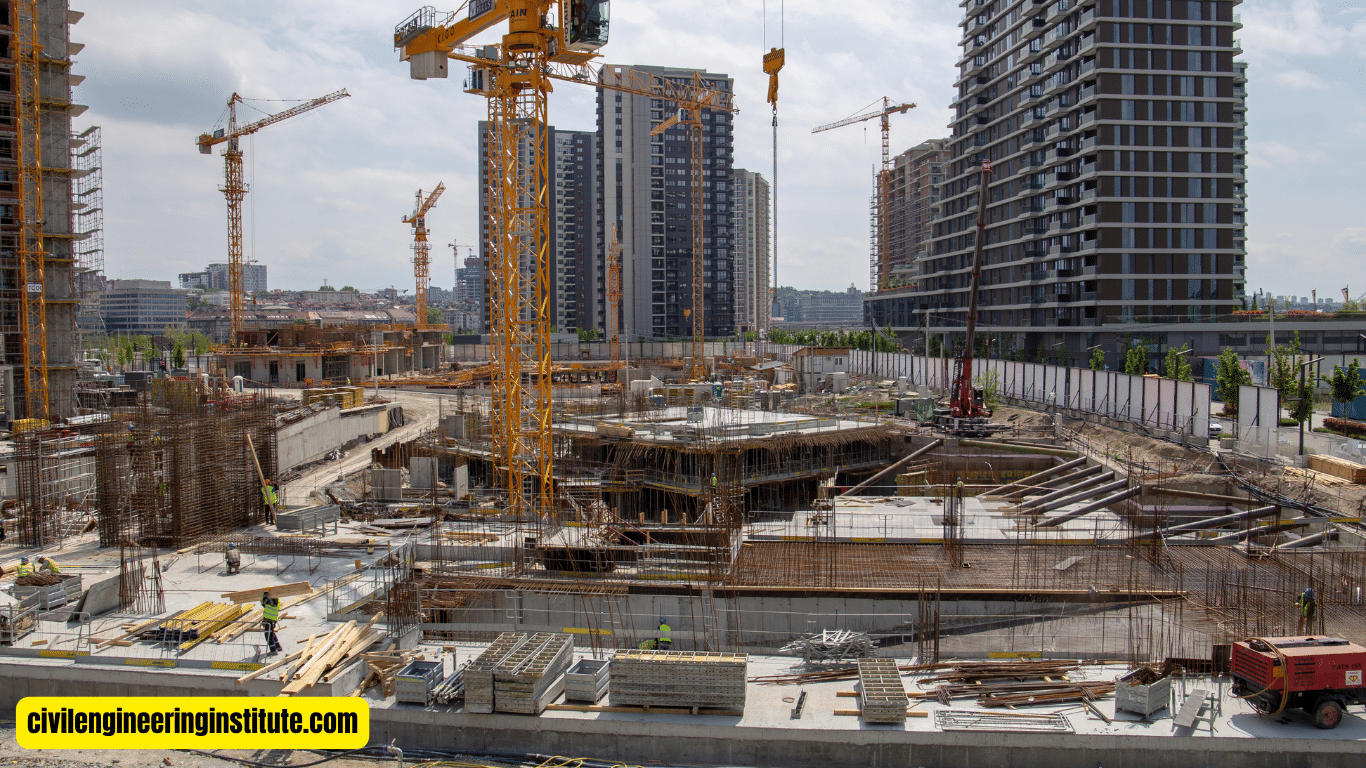In the dynamic field of civil engineering, effective project management is key to success. “Project management in civil engineering” involves coordinating various tasks, resources, and stakeholders to ensure the timely and efficient completion of construction projects. From designing structures to overseeing construction phases, project managers play a crucial role in ensuring quality outcomes while adhering to budget and schedule constraints. They utilize strategic planning, communication skills, and innovative problem-solving techniques to navigate challenges and optimize project delivery.
By emphasizing teamwork and collaboration, project managers foster a productive environment where ideas flourish and obstacles are overcome. By implementing industry best practices and staying updated on technological advancements, they drive projects toward excellence while prioritizing safety and sustainability. In essence, “Project management in civil engineering” blends technical expertise with managerial acumen to bring ambitious infrastructure visions to life, shaping communities for the better.
The Essence of Project Management in Civil Engineering
In the realm of civil engineering, the art of project management stands as a cornerstone for success. From towering skyscrapers to intricate transportation networks, every monumental structure begins with a vision and relies on the adept orchestration of resources, timelines, and expertise. In this article, we delve into the fundamental role of project management in civil engineering, exploring its significance, challenges, and essential techniques.
Understanding Project Management in Civil Engineering
At its core, project management in civil engineering encompasses the meticulous planning, execution, and monitoring of construction projects. It involves a multidisciplinary approach, integrating engineering principles with management strategies to ensure the seamless realization of infrastructure endeavors. From conceptualization to completion, project managers navigate a labyrinth of tasks, stakeholders, and constraints to deliver projects on time, within budget, and according to specifications.
The Significance of Effective Project Management
Effective project management serves as the linchpin of success in civil engineering endeavors. It enables efficient resource allocation, risk mitigation, and stakeholder engagement, thereby fostering a conducive environment for project success. By employing strategic planning, communication prowess, and adaptive problem-solving skills, project managers navigate complex terrains, steering projects toward fruition amidst myriad challenges.
Key Components of Project Management in Civil Engineering
- Strategic Planning
- Resource Management
- Risk Management
- Stakeholder Engagement
Strategic Planning: A solid project management strategy begins with comprehensive planning. This entails defining project objectives, establishing timelines, and outlining resource requirements. By delineating clear goals and milestones, project managers lay the groundwork for success, setting the trajectory for project progression.
Resource Management: In the realm of civil engineering, resources are multifaceted, encompassing manpower, materials, and equipment. Effective resource management involves optimizing resource utilization, ensuring adequate allocation, and mitigating resource constraints to maintain project momentum.
Risk Management: Civil engineering projects are inherently fraught with risks, ranging from budget overruns to unforeseen environmental challenges. Project managers employ proactive risk management strategies, conducting risk assessments, devising contingency plans, and implementing mitigation measures to safeguard project integrity.
Stakeholder Engagement: Successful project management hinges on effective stakeholder engagement. Project managers cultivate robust communication channels, fostering collaboration and transparency among stakeholders. By soliciting feedback, addressing concerns, and aligning stakeholder interests, project managers cultivate a supportive ecosystem conducive to project success.
Challenges in Project Management
While project management in civil engineering offers boundless opportunities for innovation and progress, it is not devoid of challenges. Common hurdles include budget constraints, regulatory hurdles, environmental considerations, and labor shortages. Moreover, the dynamic nature of construction projects necessitates adaptability and resilience in the face of unforeseen circumstances.
Some important queries: Project management in civil engineering
How is project management used in engineering?
Project management is integral to the field of engineering, providing a structured approach to planning, executing, and overseeing engineering projects. In engineering, project management ensures that tasks are completed efficiently, resources are allocated effectively, and timelines are met.
From designing complex structures to implementing innovative solutions, project management in engineering ensures that projects are delivered on schedule, within budget, and according to specifications. By utilizing project management methodologies and tools, engineers streamline workflows, mitigate risks, and optimize project outcomes, thereby driving progress and innovation in the field of engineering.
What are the four types of management in construction?
In construction, there are four primary types of management:
- Project management
- Construction Management
- Risk management
- Quality Management
Project management involves overseeing the entire construction project, from planning and scheduling to execution and delivery.
Construction Management: Focuses on on-site coordination, ensuring that construction activities are carried out efficiently, safely, and according to plan.
Risk management involves identifying, assessing, and mitigating potential risks that may impact the construction project, such as budget overruns, delays, and safety hazards.
Quality Management: Ensures that construction projects meet or exceed quality standards and specifications through quality control measures, inspections, and adherence to best practices.
What is called project management?
Project management refers to the systematic approach of planning, organizing, executing, and monitoring projects to achieve specific goals and objectives within defined constraints such as time, cost, and resources. It involves coordinating various tasks, resources, and stakeholders to ensure project success while mitigating risks and adapting to changes throughout the project lifecycle.
What type of project management is used in construction?
In construction, various project management methodologies may be employed, including traditional project management, agile project management, and lean construction management. Each approach offers unique benefits and is tailored to suit the specific needs and complexities of construction projects.
Traditional project management involves sequential phases of planning, execution, monitoring, and closure, while agile project management emphasizes flexibility, collaboration, and iterative development. Lean construction management focuses on maximizing value and minimizing waste through efficient processes and continuous improvement.
What are the 5 principles of construction management?
The five principles of construction management include:
- Planning: Thoroughly plan all aspects of the construction project, including scope, schedule, budget, and resources.
- Communication: Establish clear communication channels among project stakeholders to ensure alignment, collaboration, and timely decision-making.
- Coordination: Coordinate all project activities, resources, and stakeholders to optimize workflow and minimize disruptions.
- Risk Management: Identify, assess, and mitigate potential risks that may impact the project, ensuring resilience and contingency planning.
- Quality Control: Implement measures to ensure that construction activities adhere to quality standards and specifications, delivering high-quality outcomes to stakeholders.
What is the role of a project manager?
The role of a project manager is multifaceted and encompasses various responsibilities, including:
- Planning: Develop comprehensive project plans outlining goals, tasks, timelines, and resource requirements.
- Coordination: Coordinate project activities, resources, and stakeholders to ensure smooth execution and timely delivery.
- Communication: Facilitate clear and effective communication among project team members, clients, and stakeholders.
- Risk Management: Identify potential risks, assess their impact, and implement strategies to mitigate risks and ensure project success.
- Quality Assurance: Monitor and evaluate project progress, ensuring that deliverables meet quality standards and specifications.
What is the project’s life cycle?
The project life cycle refers to the series of phases that a project goes through from initiation to completion. These phases typically include initiation, planning, execution, monitoring and control, and closure. Each phase has distinct objectives, deliverables, and activities, guiding the project from conception to fruition while adhering to predefined constraints such as time, cost, and quality.
What are the five duties of a project manager?
The duties of a project manager encompass various aspects of project planning, execution, and management, including:
- Planning: Develop project plans outlining goals, tasks, timelines, and resource requirements.
- Coordination: Coordinate project activities, resources, and stakeholders to ensure efficient execution and delivery.
- Communication: Facilitate clear and effective communication among project team members, clients, and stakeholders.
- Risk Management: Identify potential risks, assess their impact, and implement strategies to mitigate risks and ensure project success.
- Monitoring and Control: Monitor project progress, track performance metrics, and implement corrective actions as needed to keep the project on track and within budget.
Conclusion
In conclusion, project management stands as the bedrock of success in civil engineering endeavors. By integrating technical expertise with managerial acumen, project managers orchestrate the seamless execution of construction projects, shaping the landscape of communities for generations to come. As we navigate the complexities of modern infrastructure development, effective project management remains paramount, driving progress, innovation, and sustainable growth in the field of civil engineering.
FAQs
What is project management in civil engineering?
Project management in civil engineering involves organizing and overseeing construction projects to ensure they’re completed on time, within budget, and to the required quality standards.
Why is project management important in civil engineering?
Project management ensures efficient use of resources, timely completion of projects, and effective communication among stakeholders, ultimately leading to successful infrastructure development.
What are the main responsibilities of a project manager in civil engineering?
Project managers in civil engineering are responsible for planning, coordinating, budgeting, and overseeing construction projects, as well as managing risks and ensuring compliance with regulations.
What are some common challenges faced in project management for civil engineering projects?
Common challenges include budget constraints, regulatory compliance, unforeseen site conditions, supply chain disruptions, and coordination among multiple stakeholders.
What tools and techniques are used in project management for civil engineering projects?
Tools such as Gantt charts, the critical path method (CPM), and building information modeling (BIM) are commonly used, along with techniques like risk assessment, resource allocation, and stakeholder engagement.
How does project management contribute to sustainability in civil engineering projects?
Project management ensures that sustainability considerations, such as environmental impact assessments, energy efficiency, and resource conservation, are integrated into the planning and execution of civil engineering projects.
What are the stages of project management in civil engineering?
The stages typically include initiation, planning, execution, monitoring and control, and closure. Each stage involves specific activities aimed at achieving project objectives.
What skills are essential for a successful project manager in civil engineering?
Essential skills include leadership, communication, problem-solving, decision-making, negotiation, and technical proficiency in civil engineering principles and practices.
How do project managers handle changes or unexpected events during civil engineering projects?
Project managers assess the impact of changes, develop contingency plans, and communicate effectively with stakeholders to adapt to unforeseen events while minimizing disruptions to project timelines and budgets.
What are some examples of successful civil engineering projects that showcase effective project management?
Examples include the construction of bridges, highways, dams, airports, and skyscrapers, where meticulous project management has resulted in iconic structures that benefit communities and economies.






